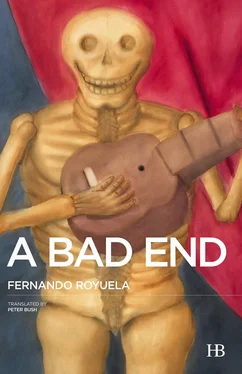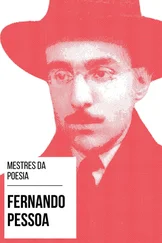Fernando Royuela - A Bad End
Здесь есть возможность читать онлайн «Fernando Royuela - A Bad End» весь текст электронной книги совершенно бесплатно (целиком полную версию без сокращений). В некоторых случаях можно слушать аудио, скачать через торрент в формате fb2 и присутствует краткое содержание. Год выпуска: 2016, Издательство: Hispabooks, Жанр: Современная проза, на английском языке. Описание произведения, (предисловие) а так же отзывы посетителей доступны на портале библиотеки ЛибКат.
- Название:A Bad End
- Автор:
- Издательство:Hispabooks
- Жанр:
- Год:2016
- ISBN:нет данных
- Рейтинг книги:3 / 5. Голосов: 1
-
Избранное:Добавить в избранное
- Отзывы:
-
Ваша оценка:
- 60
- 1
- 2
- 3
- 4
- 5
A Bad End: краткое содержание, описание и аннотация
Предлагаем к чтению аннотацию, описание, краткое содержание или предисловие (зависит от того, что написал сам автор книги «A Bad End»). Если вы не нашли необходимую информацию о книге — напишите в комментариях, мы постараемся отыскать её.
A Bad End — читать онлайн бесплатно полную книгу (весь текст) целиком
Ниже представлен текст книги, разбитый по страницам. Система сохранения места последней прочитанной страницы, позволяет с удобством читать онлайн бесплатно книгу «A Bad End», без необходимости каждый раз заново искать на чём Вы остановились. Поставьте закладку, и сможете в любой момент перейти на страницу, на которой закончили чтение.
Интервал:
Закладка:
Apart from his canary-colored hair, Gurruchaga had the loveliest hands when it came to cooking our grub. He never washed them, and perhaps that’s why his meals were always incredibly tasty. When we erected our installations in the places we were going to perform, he was responsible for two main tasks: the organization of all the tackle for our encampment, and procuring food for the animals, even for the lot of us, if circumstances required. The general norm established by repeated practice was for one family from all the circus families to see to the cooking of one meal that should be for everyone who felt like partaking. The Montinis, for example, the high-wire acrobats, offered macaroni without chorizo, the Gutiérrezes, the jugglers, cooked mountains of rice with a wonderful aroma, and the Gambero-Gamboas liked to pickle whatever they got their hands on. Gurruchaga provided the raw materials for the dishes, even though he was only occasionally called upon to prepare our pittance. If he cooked, the wherewithal of his meals could scale unheard visual heights, often verging on works of art in terms of shape, color, and texture. The taste was something else, and opinions tended to differ or even be hostile, so he was rarely allowed to be chef. We who’ve so often been starving to death have always been fascinated by the paraphernalia of cooking, perhaps because our stomachs have long memories when it comes to the hungry years. On the threshold between late childhood and early adolescence, I went from bread and dripping, perhaps sprinkled with sugar, to Gurruchaga’s grandiloquent offerings, and that made me realize I’d grown up. The content made the difference; my stomach began to expand and channel substance to my head. Nonetheless, it wasn’t all delicious delights. Food shortages and lack of ingredients meant there were days when we were reduced to bread and water. These were the last of the hungry years, with a hefty sting in their tail, when welfare and development had yet to hit Spanish hearths. That’s why when juicy fodder was on offer, we filled our bellies fit to burst for fear of what tomorrow might bring, and it ended up looking like a wedding feast for beggars. “Hey, kid, how come you were born a dwarf?” Gurru would ask while he was stirring a pot of lentils and pig snout and other nice porcine offal. “Why do you dwarves have elongated heads?” he kept on with his queries. “You dwarves are oddballs. You seem made differently, but in the end you do everything the same as the rest of us, and you’re probably even bigger cusses.” I ignored his insidious chatter and shut my mouth, so I didn’t swallow more flies than would strictly come with the food. “You dwarves should be governing Spain and not Franco. With those big heads of yours, I bet you’d work out a better future for us,” and he chewed and chewed until he regurgitated his gastric juices out of the dry flaking corners of his lips.
We reached Córdoba on a morning white with almond blossom that smelled of the high seas. The mineral structure of the mosque glittered against the indigo sky, like a silhouette of the past plucked from a fairy-tale twilight. The Stéfano circus camped its caravans on the other side of the Guadalquivir, on an esplanade opposite the Calahorra Tower, next to some ruined mills. Gurruchaga was happy, which was quite unusual for him. He smiled broadly, like a young kid. The air reached us from the river with a scent of toads, and we all quivered and shivered differently; ours was an intense desire to live life to the full. These were the lethargic early sixties, and the threadbare curtain of misfortune was beginning to fall in tatters on the Spanish spectacle of starving cadavers. The first sparks of hope and tangible signs of economic well-being were evident in the way people behaved, although the real takeoff had yet to come. The military were shuffling offstage, and technocrats were taking over the reins of that pompous, freedom-killing, single-voiced nation whose fate, by the grace of God, was still shaped by a Caudillo. Nonetheless, Córdoba dawned that day half Roman, half Moorish, oblivious to the jiggery-pokery of the Movement, swirling with archangels and swallows, Saint Raphaels and Caliphs, the phantoms of tradition or legend.
The city’s raucous trade was resuming. Carts of fruit and vegetables were crossing Julius Caesar’s bridge, coming from the orchards in Almiriya and turning up the streets to the Plaza de la Corredera, where traders set up their stalls very early. It was the Thursday market, and hens shrieked in their cages, waiting to be scalded in stewpots. It was a resplendent Thursday market, and the aroma of cold meat and sausages wafted through the air on the briny Andalusian breeze — pork loins toughened by the rising temperature, sparkling saffron juices trickling from chorizos, a rich aroma of brawns spreading across a decorous backcloth of strings of garlic, bunches of carnations, and earthenware jars full of green olives. That spot was a delight to the senses. Everything was on display and up for sale. Amid so much color and so many spicy, piquant smells, Gurruchaga’s eyes lit up with the single desire to cook a local dish. “Have you ever tried Cordoban salmorejo ?” he asked, enthused. “I don’t have a clue what that is,” I replied. “And what about oxtail? Have you ever tried oxtail?”
At the dinner organized by the Meredith Brothers Foundation from which I’ve just returned, they’d given us breaded cocks’ combs and not oxtail or Cordoban salmorejo . They were wafer thin and dissolved on the tongue like communion wafers. As I wasn’t really hungry, I hardly took a bite of the other courses, which may have been interpreted as grossly impolite, given my prestige in this country’s food industry. Nothing could be further from the truth. I’d had enough with the cocks’ combs and the wine to notice what was happening. During the entire soirée, the commissioner had done nothing but rub in my face how efficient the anti-hemorrhoid cream was that she was now applying to her intimate problem, so much so that she challenged me to take a look at the outcome. I had no desire to go against her wishes and jotted my address on a piece of paper with a request for her to come when the dinner was over. She smiled as she read my note and gave me a gleeful glance that flickered morosely. Politicians are unpredictable. Women are voluble. Providence wiles away its hours on such sarcastic ploys.
That day, I was coming back with Gurruchaga from doing the job we’d been assigned. We’d bought a sack of tomatoes from some gypsies, and they were in such a bad state they were a wondrous sight, all together fermenting like a bunch gone to rot. I stumbled on behind. I was wearing six oxtails twisted around my neck like a necklace of meat — hot skins, the plumes of their tails sluicing down my back and trailing across the ground behind me. Gurru had got them at a bargain price from a sharecropper working on a farm. They were already giving off a stink that betrayed their vintage. I used all my strength to keep them aloft, but their weight and my short stature made it impossible, and they snaked behind me, furrowing the dust on my footprints. When we were crossing Caesar’s bridge, now almost back at the circus, a few hooligans who’d been staring at that great event began to taunt us with insults and barbed jokes. It was obvious they thought it very funny to see a dwarf wrapped in oxtails sweating his guts out. “’Ey, a dwarf wi’ six tails,” they screamed and laughed. “’Ey, cop that, a dwarf bugger who’s escaped from the circus.” “’Ey, you dwarf bugger, where’s yer off to with all ‘em tails?” they kept shouting as they circled us. Gurruchaga suddenly turned around and gesticulated frantically at them to clear off. “Leave us in peace, you bastards, off you go and do something to keep your whore mothers happy.” They didn’t like his riposte one bit, and their scabby tempers became more frayed by the second. “All those fat cocks yer’ve ‘ad stuck up yer asshole must ‘ave made a big mess, right, yer little faggot?” they jibed, as they aimed kicks at our sack of tomatoes. “I’d bet yer’d giv’us a butchers if we giv’yer a peseta.” He kept walking, deadpan, trying to ignore them, deeply sunk in that hermetic silence of his. To avoid a confrontation, he looked into the distance, at the indigo sky spreading before us like a defining display of nature. Gurruchaga knew about insults, beatings, and bullying. Memories of such were open sores in his flesh. They came within an ace of executing him after the shortest of trials when he fell into the hands of the National Army, right at the end of the civil war. Providence was charitable enough to ensure the military didn’t discover what company he’d kept before their uprising, and he was only given a life sentence: forced labor in the Valley of the Fallen. I only found out about these circumstances years later, after General Franco had died, I suppose because of a similar intervention by Providence that spared him from execution. It was then I discovered he’d managed to escape from the Valley with three other prisoners, they were being hunted down, and by a freak of destiny he fell into the hands of Di Battista, who offered him silence and shelter in return for hard work and no pay. He was trying to bury himself in the circus when I turned up. Red and fag were words that had long since lost all meaning as far as he was concerned. Gurruchaga nurtured an open wound in his heart, an abyss in his soul he avoided hurling himself down at the cost of constant self-denial. “Yer’ve got yeller skin, chicken yeller, yer fag, bet yer paint yerself, so the big machos chase yer ass.” We kept walking, dodging the insults and kicks they threw our way, trying to intimidate us. Once we’d crossed the bridge and were close to the first caravans of the Stefáno circus, fed up and sweaty as we were, the worst was yet to come. One of the youths, no doubt the cockiest of the lot, grabbed one of my oxtails and started whipping me. Bastards are always deciding to lash me, I can’t think why. Human beings are complex, and the mentality of such bastards is so tortuous as to be unfathomable. He lashed me twice hard in the face with that leathery tail. The little bone at the end almost gouged one of my eyes out. I shouted, and the wretch started to lash me even harder simply out of the pleasure he got from seeing me squirm. He lashed me another five times, until Gurruchaga, stirred by my grief, threw the sack of tomatoes to the ground and then, without more ado, chucked himself at the youth big time, and head-butted him. That spread-eagled him on the ground, where he started punching him in the stomach with clenched fists in an attack of unbridled brutality I’d never seen from him before, to the point that crimson blood started bubbling from his victim’s mouth. When the rest of them saw Gurruchaga the caveman in action, they shot off back over the bridge like frightened rats, toward the vicinity of the Mosque, in search of shelter in those narrow streets. “Let him be, or you’ll kill him,” I shouted, and he held his fist in the air for a thousandth of a second, unsure whether to smash his face in or restrain the kinetic, hateful energy pulling on his arm from the pits of destruction. In the end he put the brake on and let his victim go, blood-streaming and splattered, but alive, bruised on the inside but still breathing. The orange-blossom-scented air the branches of Córdoba’s orange trees spread through the air would soon have revived him, if destiny, that ever-vigilant serpent, hadn’t flickered its tongue. Up to then, nobody had ever moved a single finger with such determination on my behalf, not even Scarface the miller had gone so far when rescuing me from the rage of toothless Santomás. My cause was that of the destitute, abused, and emaciated, the dispossessed, helpless, and needy on their uppers. A language is enriched by the disasters experienced by the people that speak it — their prolonged misfortunes. Language is an enigma of synonyms that come from the common weal of shared suffering, an alphabetic mirror of the dread circumstances men endure. The collection of symptoms of catastrophe articulated into a code shapes a single language: that of the wretched of this earth, that language I spoke so elegantly. How distant and yet how recent that world now seems. Nobody had ever bothered to wield on my behalf the brazen justice of bare fists, the kind that comes to the boil for all to see — noble, savage, powerful, and mighty. Never before had I seen someone else raise their hand to avenge me, and do believe me if I say that I enjoyed the feeling of being protected. Every time Gurruchaga’s fist belted that Cordoban hooligan in the stomach, I smiled contentedly. The harder he punched, the more I relished it, until an ineffable smile of bliss almost lit up my face. Gurruchaga was the implacable avenger who appears in stories about helping the poor and needy, the fantastic hero who soothes pain and rights wrongs. That youth fled over the bridge like a rabbit, making huge leaps over the Guadalquivir, rapid leaps like the ones a river makes when poverty dwells on its banks. We watched him scarper under the crumbling ruins of the Puerta del Puente, beneath the cracked friezes of Samson and Delilah. He was a dead blob in the distance, a future corpse in the heat of the sun. Gurruchaga picked up the sack of tomatoes, and I slung the string of oxtails over my shoulders, and we made a triumphant entrance into the circus, two proud angels, two figures from the unfinished nativity scene of history.
Читать дальшеИнтервал:
Закладка:
Похожие книги на «A Bad End»
Представляем Вашему вниманию похожие книги на «A Bad End» списком для выбора. Мы отобрали схожую по названию и смыслу литературу в надежде предоставить читателям больше вариантов отыскать новые, интересные, ещё непрочитанные произведения.
Обсуждение, отзывы о книге «A Bad End» и просто собственные мнения читателей. Оставьте ваши комментарии, напишите, что Вы думаете о произведении, его смысле или главных героях. Укажите что конкретно понравилось, а что нет, и почему Вы так считаете.












